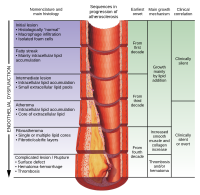
Photo from wikipedia
OBJECTIVE To investigate the clinical effects of acipimox in patients with vulnerable carotid atherosclerosis. METHODS 80 patients with vulnerable carotid atherosclerosis who were admitted to the Department of Cardiology in… Click to show full abstract
OBJECTIVE To investigate the clinical effects of acipimox in patients with vulnerable carotid atherosclerosis. METHODS 80 patients with vulnerable carotid atherosclerosis who were admitted to the Department of Cardiology in Wuxi Second People's Hospital between February 2020 and October 2021 were enrolled in this study. All of these patients were randomly divided into an observation group (n = 40), who were given acipimox and conventional treatment, and a control group (n = 40), who were given conventional treatment. The levels of blood lipids and adiponectin (APN), the carotid intima-media thickness (IMT), the area, thickness and number of CAS, peak systolic velocities (PSV) and end-diastolic blood velocity (EDV) of common carotid artery (CCA), and the level of inflammatory markers were measured and compared between the two groups pretherapy and posttreatment. Then, the adverse events were collected and compared between the two groups posttreatment. RESULTS The demographics and basic clinical characteristics were not significantly different between the two groups. At posttreatment, the levels of TC, LDL-C, ANP, IL-6, TNF-α and hs-CRP in the observation group were significantly lower than those in the control group at posttreatment. Moreover, the IMT and the area and thickness of CAS in the observation group were significantly lower than those in the control group. After treatment, PSV was lower and EDV was higher in two groups than before treatment; after treatment, compared with control group, PSV in observation group was lower, while EDV was higher. Most importantly, the rate of adverse events was similar in the two groups. CONCLUSIONS Acipimox reduced the blood lipid levels in patients with vulnerable carotid atherosclerosis. It also stabilized vulnerable plaques and reduced CAS.
Journal Title: Vascular
Year Published: 2022
Link to full text (if available)
Share on Social Media: Sign Up to like & get
recommendations!